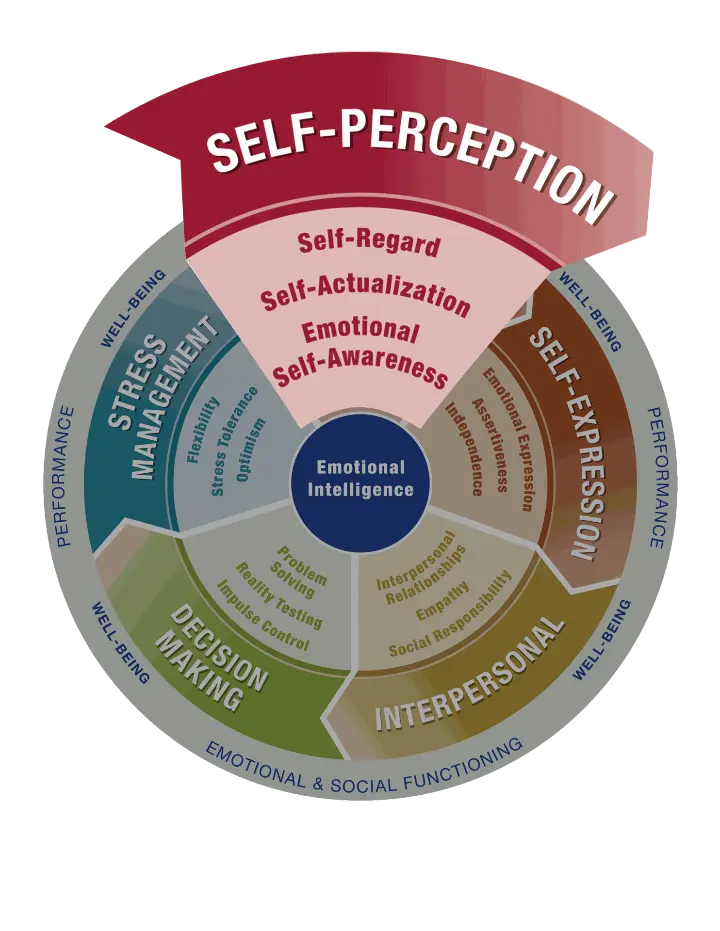Knowing yourself better can help you lead with authenticity
📊 Have you ever taken a personality test?
🤔 Are you interested in learning about why you think the way you do?
💡 Do you enjoy listening to podcasts that help you understand yourself better?
If that sounds like you (Same, btw - I love this stuff!), then this is the post for you.
Why? Because it sounds like you value knowing yourself– which is an essential part of self-perception.
Self-perception is one of the five components of emotional intelligence (EQ).
It’s also the best place to start when you’re trying to improve your EQ. And that’s not just because it’s where the EQ-i 2.0 assessment I use starts. It’s also because this area of EQ is the foundation for all the rest of the areas. Our experience of our emotional realm begins internally with us.
Alsooo, when we have a strong understanding of our emotions, we’re laying a groundwork that allows us to expand on all the other skills that we use externally to:
- express ourselves
- build relationships
- solve problems
- manage the stress that comes our way.
So let’s start here. In this post, I’ll tell you about each of the three skills of self-perception and share tips you can use to improve each of those skills. Then at the end, I’ll show you how you can get started working with me if you’re ready to build radical confidence in your leadership.
Sound good? Let’s go, leader!
What are the three skills of self-perception?
Okay, before we jump in, I need to clarify one thing.
When I’m referring to self-perception within the EQ model I use, I either call it a ‘composite dimension,’ or a ‘pie slice’ of the model (I mean, look at it! Doesn’t it look like a beautiful pie with five different flavors?). The composite dimensions are a bit conceptual, but within each one, we have three distinct EQ skills.

The reason behind that language is that just like with other skills (riding a bike, learning to knit) you have the ability to work on these skills and get better at them over time by practicing. These aren’t personality traits that you either have or don’t have.
Every single one of us can work on each of these EQ skills at any time.
Alright, now we can talk about the three skills of self-perception.
1. Self-Regard
Where do you think your confidence comes from– the promotion you received? The most recent award you won? The advanced degree you completed?
Those are all exhilarating milestones. We often think our confidence comes from having a lot of skill in an area. We strive to know a lot of things. We work to become an expert in our industry by achieving a lot of qualifications.
Wanna know the truth, though? Our confidence comes from how we see ourselves, how we talk about ourselves, and how we relate to ourselves. That’s also what self-regard is all about.
Self-regard is your ability to respect and accept yourself. The EQ-i 2.0 says it’s about understanding your strengths and limitations and feeling confident in all of your abilities. [1]
Here are some questions to ask yourself when thinking about self-regard:
- What am I good at?
- What am I not good at?
- Am I able to like and respect myself?
- What negative ways of seeing myself is it time to let go of?
This is such an essential EQ skill. It’s also one that I see a lot of queer leaders struggle with. So here’s my first tip for you to use to work on your self-regard.
- Tip #1: Reflect
Society is often telling us that we’re not enough as queer leaders. It’s all too common for us to be dehumanized within our work environments. So I want you to reflect on this question:
As a queer leader, what are ways you protect yourself from oppressive messages?
It’s crucial that we nurture a sense of positive self-regard because so much of the world is actively working against us having it. Trust me; you are freakin’ awesome, and you deserve to feel that way about yourself. (BTW, your queerness is PART of what makes you and your leadership awesome!)
And you don’t need to feel selfish for looking inwardly, either. More on that next.
2. Self-Actualization
Did that phrase bring you back to a high school or college psychology course? I’m not surprised. The term ‘self-actualization’ is commonly associated with the teachings of psychologist Abraham Maslow. Here’s a little refresher on his ideas, plus some interesting history you might not have known.
Here’s how Maslow’s hierarchy works:
- It starts with your need to have your most basic needs (food, shelter, physical safety) met first.
- Then, you progress and move upward by having your psychological and emotional needs met.
- Eventually you get to the top of the hierarchy. And that’s where you’re able to self-actualize.
Maslow learned about some of this from his time with the Blackfoot tribe. The issue here is that the way this tribe thinks about needs and people within the community is actually quite different than the more individualistic hierarchy of needs we know about today. If you’re curious to know more, I recommend checking out this interesting read by Teju Ravilochan. It highlights how self-actualization isn’t the cherry on top, but that it’s a real need for all of us. [2]
With that background in mind, here’s how I frame self-actualization in my coaching and how it applies to your leadership.
The EQ-i 2.0 says that self-actualization is about trying to improve yourself by engaging in meaningful objectives that add value to your life. [1]
Since there’s that goal-setting aspect involved with self-actualization, I want to clarify something here.
There is such a ‘cult’ of self-improvement out in the world. And it can be easy to equate true self-actualization (pursuing meaningful growth) with constant self-improvement informed by white supremacist capitalism (Lose weight! Get rich! Be disciplined and productive!). So I want to highlight the difference here.
Some people really enjoy the activity of setting a goal, working on it, improving, and achieving something. So self-actualization can be something like getting a certification or a degree. But it can also be:
- Creating more harmony between work and other parts of your life.
- Wanting to feel free of the anxiety that tells you that you always have to be doing something.
- Giving yourself permission to rest and play as much as you need to.

Self-actualization at its finest: this queer folk walks confidently in their truth, shining with the joy and freedom that come from living authentically.
Photo by Mental Health America (MHA) from Pexels
These concepts aren’t at odds with self-actualization– they actually support it. So here’s my next tip you can use to get clearer on how you can self-actualize.
- Tip #2: Journal
First, run through this quick Values Clarification exercise. Then use these prompts to record:
- When you were most aligned with your values during the day.
- Times you felt out of alignment with your values.
- Ways you think you could create more alignment with your values in the future. [3]
The most important piece of self-actualization is to focus on the goals and objectives that are truly important to you– not what the world tells you that you should achieve to have value.
Capitalism is telling us we constantly need to be going and achieving. And I know you can push back on that by working to self-actualize and tap into your emotions. Let’s get into our last skill next.
3. Emotional Self-Awareness
Imagine you’re giving a presentation later this afternoon. Your senior leadership is going to be there. You’ve been preparing for weeks.
And then they cancel last minute.
Now think about how you’d feel. Would you feel frustrated? Disappointed? Annoyed? A blend of emotions?
Naming these feelings is one of the main points of emotional self-awareness.
The EQ-i 2.0 says that emotional self-awareness is your ability to recognize your emotions, understand their differences, know why you feel them, and see how they have an effect on you and others. [1]
If you were working with me on self-awareness, we’d make sure to focus on all those factors. Because within my coaching practice, so much of the process involves talking about how things feel. So we’d look at a situation and analyze:
- What were you feeling?
- What was going on for you?
- What was becoming activated for you?
The central skill of emotional self-awareness is knowing what you’re feeling during any given moment. It’s being able to stop and notice that you’re having an emotion. Then from there, it’s about pulling apart the experience of the emotion until you can name what it is.
With that comes why am I feeling this emotion? What caused you to feel that way? And then you can examine how you come by your emotions. So here’s my next tip for you.
- Tip #3: Check out these resources
1. Take a look at the Atlas of Emotions website. It’s an interactive model of different emotional experiences. [4]
2. Look over this Feelings Wheel. It’s another helpful tool that can help you in naming your feelings if that’s not a skill you have or if it’s a skill you need to develop more.
Self-perception is the first area of EQ you should start with if you want to be a more confident leader.
Want to know how you can work with me to increase your self-perception and overall EQ? I’m about to tell you that next.
Conclusion
This work is foundational for all of the rest of our emotional intelligence. Knowing what you’re feeling as a leader at any given moment enables you to share your emotional experience at work. You can make space for your emotions (even when leaders are told they shouldn’t). And you can do it in a way that doesn’t harm the people around you or your relationships with your teams.
To work on any of the other composite areas (stress management, decision-making, interpersonal relationships, or self-expression) we need to know what we’re feeling. We need to understand ourselves well. We need to know what’s going on within us first.
If you’re ready to bring your emotional intelligence and self-perception to a new level– great! Let’s talk about how you can build radical leadership confidence as a queer leader.
You hold powerful magic. I’d be glad to be a part of helping you realize your full potential.
You can book a free discovery call with me here – I can’t wait to support your confidence journey.
Links to References
[1]https://drive.google.com/file/d/1Ja66nlP9GIbqe2oW0zPNcqPDYznSH-1D/view?usp=drive_link
[2]https://gatherfor.medium.com/maslow-got-it-wrong-ae45d6217a8c
[3]https://drive.google.com/file/d/1KVig47PSAevd-H_eKs-O_FPsz-oeXPVz/view
[4]http://atlasofemotions.org/